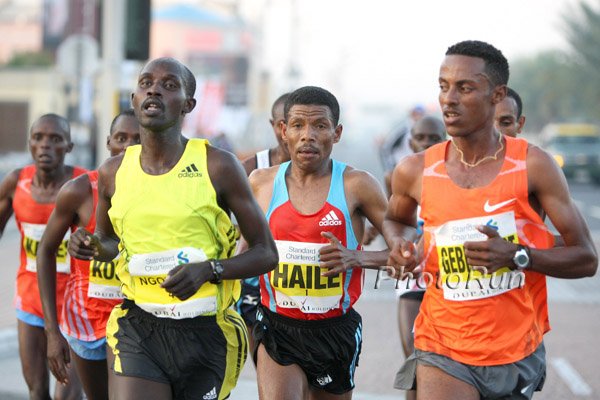 by Matt Fitzgerald
by Matt FitzgeraldHe missed his world record, but the Ethiopian great still won the Standard Chartered Dubai Marathon in 2:06:09.
To break his world record of 2:03:59, Haile Gebrsellasie needed to run 2:56 per kilometer in Friday’s Dubai Marathon. He and the other race leaders ran the first kilometer in 2:58. It was the beginning of a hole that got a little deeper with each subsequent kilometer until, at the halfway mark, passed in 1:02:51, the goal was completely out of reach.
To make matters worse, despite the slower-than-planned pace, Gebrselassie dropped all of his rivals and found himself running alone through the latter miles of the race. After crossing the finish line, he blamed his disappointing performance on having slept in an unusual position and woken up with a sore back. It may sound like excuse-making, but even if it is not, I am inclined to blame the failed record attempt at least in part on something else.
That something else was only alluded to in another comment that Gebrselassie made after finishing. “The weather was a bit warm, but overall not so bad,” he said. The thing is, in a marathon, and most especially in a marathon world record bid, a bit warm is really bad.
Many runners believe that cool conditions are ideal for marathon running, but research has shown that relatively cold weather is even more conducive to running faster times. Recently, researchers from the U.S. Army Research Institute of Environmental Medicine gathered many years’ worth of race results and weather data from six major North American marathons and performed statistical analyses to determine the effect of air temperature on finishing times among runners at various levels of performance.
The results showed a clear trend toward faster times at colder temperatures. For example, the finishing times of male race winners were closest to the course record (only 1.7 percent slower than the very best time on each course) when the air temperature was between 34 and 50 degrees. The finishing times of the top male runners were 2.5 percent slower than the course record, however, when the temperature was between 51 and 59 degrees. And at temperatures exceeding 60 degrees, finishing times fell off even more dramatically.
The ideal marathon temperature, according to these analyses, was a bone-chilling 41 degrees. Think about that when you sign up for your next marathon!
I think it’s no accident that Gebrselassie has set both of his marathon world records in Berlin, Germany, and is 0-for-3 in Dubai. The air temperature in Dubai was roughly 64 degrees during the latter part of the race. During the 2008 Berlin Marathon, when he set his still-standing second world record, the air temperature was almost a full 10 degrees cooler.
I know that Dubai treats Gebrselassie very well and that he enjoys running there. But he is even more passionate about setting records, and for that reason I think he would be well advised to race somewhere else.




 ShareThis
ShareThis